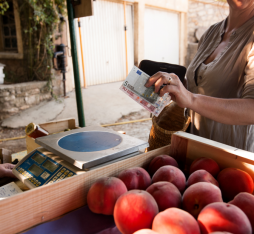As part of Stéphane Richard's new Engage 2025 strategic plan, Orange is committed to digital equality and wants to accelerate the conquest of all its growth areas, including financial services. Accordingly, Orange Bank wishes to offer a new banking experience that gives power back to the people. Providing them with the necessary financial literacy therefore seemed like the right thing to do.
More and more countries are becoming aware that it is time to take action to increase their populations’ financial literacy. In this first post, we take a look at some of the initiatives in the area of financial literacy in France. Find out how other countries are addressing this “national priority” in future posts.
What is financial literacy?
Financial literacy helps individuals know how to best manage their money in terms of their life goals and their economic and financial situation. It should enable everyone to make informed financial decisions. Financial literacy is all the more essential in a digital world that gives the customer a considerable amount of autonomy. Indeed, the digitisation of banks has given individuals more opportunities in terms of account monitoring, payments, financing and even investments, but these are not risk-free [1].
The OECD Council of June 2012 defined financial literacy as a “combination of financial awareness, knowledge, skills, attitude and behaviours necessary to make sound financial decisions and ultimately achieve financial well-being” [2].
As one can imagine, the scope of financial literacy is vast. It encompasses budgetary education (personal or family budget) and learning about banking tools (everyday banking, savings, insurance), as well as understanding economic concepts (how the economy operates and is financed) and public policies.
Financial literacy is now among the growing concerns of the authorities at both national and international level. With the G20 advocating for it as one of eight core competencies, it is considered essential to protecting and improving one’s financial well-being.
French people fall short in financial literacy
Historically, the French have had a cautious and reserved stance on money-related issues. Studies show strong disparities in financial knowledge among the population based on age, level of education, gender and position in the labour market.
The OECD Programme for International Student Assessment (PISA), which assesses education systems across the world by testing the skills of 15-year-olds, has been testing students’ financial knowledge, as well their ability to apply this knowledge in order to solve financial problems [4], every three years since 2012 [3]. They answered questions on bank accounts and credit/debit cards, budget planning and management, understanding taxes and savings, risks and returns, consumer rights and liability for financial transactions, as well as their own confidence in this area. The results were unanimous, revealing a low success rate for French students.
More recently, the 2016 Allianz study “Money, Financial Literacy and Risk in the Digital Age” [5] corroborated these results. One thousand people were interviewed in each of the ten Western European countries. France came last in the financial literacy rankings, behind Portugal and Italy, while Austria, Germany and Switzerland came out on top. Slightly fewer than half of the French respondents answered correctly to the two financial literacy questions on the principles of inflation and interest rates. And only 9% of them were able to identify the right answers to the three questions about financial risk concepts. The study also shows that Millennials (born in the 1980s and 1990s) have the lowest level of financial literacy.
Beyond these assessments, 8 out of 10 French people say that they lack basic economic and financial knowledge, do not understand certain banking operations and generally fail to grasp this area, which they think is deliberately obscure [6]. In 2019, the Bank of France’s study on the level of financial literacy in France revealed that 43% of French people feel that they do not have sufficiently reliable and neutral information to manage their budgets effectively, and that 77% consider their knowledge of financial matters to be average or poor [7].
The benefits of better financial literacy
Several studies have shown that better financial literacy from an early age could be beneficial, especially in terms of debt prevention. The Allianz study [5] shows that people with a good understanding of financial concepts and risks are twice as likely to make better financial decisions and manage their money better than those without this knowledge. Similarly, the level of financial literacy positively influences households’ financial behaviour, particularly the ability to plan a long-term budget.
The benefits of financial literacy are numerous. At a national level, a good level of financial literacy helps to improve financial stability and contributes to the growth of the country’s economy. As Christian Noyer (former Governor of the Bank of France) points out, “the French people’s level of financial literacy has a strong influence on their consumption and, indeed, on the development of the country”. In this sense, financial literacy is a factor in economic efficiency and social equity.
Government initiatives
To meet the continuing needs for financial literacy in France, in 2016 the government launched the National Strategy for Financial Education, with the aim of improving the economic, budgetary and financial knowledge of the French people. Appointed by the French Ministry of Finance as the national operator of this strategy, the Bank of France is responsible for translating it into concrete actions for the general public, teachers and social workers throughout the country.
The strategy for educating the public on economic, budgetary and financial matters is based on five pillars:
1. Developing budgetary and financial education for young people, incorporating financial literacy into their schooling from an early age
2. Developing skills for social workers to use when supporting people in precarious financial situations
3. Supporting lifelong budgetary and financial skills, providing everyone with carefully selected, neutral, educational, up-to-date, free information, as well as easy-to-understand tools to aid in decision-making
4. Providing all audiences with the keys to understanding economic discussions
5. Supporting business owners with their economic and financial skills
The Bank of France distributes shared training materials and facilitates access to neutral and educational information through “Mes questions d’argent” (“My money questions”), the national portal for economic, budgetary and financial education [8]. In parallel, France’s Institute for Public Financial Education (IEFP) is responsible for developing a financial education programme for everyone through its “Finance pour tous” (“Finance for all”) website [9]. This is now the reference site for the general public. In October 2017, a framework agreement was signed between the Bank of France, the Ministry of National Education and the IEFP to teach basic economic and financial literacy in schools.
In addition, the Crésus associations help people who are overburdened with debt, and in general any individual with financial problems. To do this, Crésus has developed a budgetary and financial education programme called “Dilemme”, as well as various materials providing educational aids for any audience. This programme has multiple aims: to develop independent, responsible citizens, to change their relationship with money, to provide essential financial information, to address budget management issues etc. The programme should help to provide the necessary resources for people to be entirely financially active, independent and competent [10].
In November 2019, the strategic committee on financial literacy (which includes over 20 institutional and community stakeholders: AMF [French Financial Markets Regulator], OECD, FBF [French Banking Federation], French National Union of Family Associations, CLCV [French Consumption, Housing and Living Environment Association], Crésus, French Red Cross, UFC-Que Choisir consumer group, MEDEF [French employers’ federation] etc.) announced that new initiatives would be put in place over the next few years [11]. This strategy targets three specific groups: young people, households overburdened with debt and business owners. Its aim is to provide basic financial knowledge and skills to help these groups to manage their budgets and set aside savings. These initiatives include:
- the introduction of an EDUCFI (financial literacy) passport at school (learning about budget management and using payment methods),
- the incorporation of financial literacy in universal national service and in secondary schools,
- the Bank of France-led roll-out of “savings meetings” for the general public,
- centres (150 certified budget advice locations) to provide information and advice, and to identify and better guide people in financial difficulty,
- advice centres in each French department, coordinated by the French Financial Markets Regulator (AMF) and the French Prudential Supervision and Resolution Authority (ACPR),
- the development of a mobile application for 17–25-year-olds on concepts of financial literacy,
- a second version of the Mesquestionsdentrepreneur.fr portal, including a financial analysis game to help business owners,
- as well as a new study to measure the effect of these initiatives on the French population.
These strategic decisions suggest a willingness to support the general public from an early age and provide reliable and neutral information.
Banks and FinTechs
Financial literacy is hardly dealt with at all by traditional banks, and their investments in this area remain limited. Most major banks devote space and content to making young people aware of budget management, but do not provide real operational tools. Banking offers for young people often remain very basic, focusing on traditional products such as savings (“Livret A” [tax-free, fee-free savings account] and youth accounts) or an account associated with an ATM card for children over the age of 12 (examples include Banque Postale’s Régliss prepaid bank card, Crédit Agricole’s Mozaic card, Société Générale’s V Pay card etc.). However, these offers do not always appear to be suitable for the uses of today’s young people.
Online banks are just beginning take an interest in the 12–17-year-old market and offer banking products with no real focus on financial literacy (examples include Boursorama Banque’s Kador card, Nickel’s Nickel card, Morning’s Morning Jump card and Macif’s prepaid card).
For its part, FinTech has understood that young people’s financial literacy offers new market opportunities and provides genuine support to adolescents, from managing pocket money to financial autonomy. In 2019, three neobanks targeting young people were launched: Xaalys, Pixpay and Kard. Their “educational” offers differ in their philosophy and positioning, but they all focus on a fun mobile application, a personalised Mastercard card with systematic authorisation, scalable parental control features and nest eggs.
Conclusion
This assessment confirms that France has become aware of the scale of the task at hand in terms of financial literacy. Initiatives are emerging, but are still relatively unknown to the general public.
Moreover, individuals are displaying a growing loss of confidence in banks [12]. Adequate levels of financial literacy and greater transparency will help banks to regain that confidence. It is everyone’s responsibility, including the banks’, to embrace this new form of social and financial inclusion.
As a digital bank with a human element, Orange Bank’s mission is to support its customers. How do we teach young people to have a responsible relationship with money in our digital world? How can we provide lifelong support to vulnerable groups? What can Orange Bank do to help customers regain power over their money through digital tools and appropriate financial literacy?
Orange Research takes a keen interest in all these questions.
[1] Suivre ses dépenses sur mobile: un ajustement budgétaire en temps réel (Mobile expense tracking: a real-time budget adjustment). Orange internship report, Ophélie Nouhant and Anne-Sylvie Pharabod, 2016.
[2] Organisation for Economic Cooperation and Development (OECD) – Atkinson and Messy, 2012.
[3] OECD (2019), PISA 2018 Results (Volume I): What Students Know and Can Do, PISA, OECD Publishing, Paris. https://doi.org/10.1787/5f07c754-en
[4] Questions and answers from the PISA financial literacy assessment.
[5] Allianz “Money, Financial Literacy and Risk in the Digital Age” study, 2017.
https://www.allianz.com/en/press/news/studies/170127-are-you-financially-literate.html
[6] Marx Bernard, Micoleau-Marcel Pascale, Sarlat Guillaume. Promouvoir l’éducation financière du public (Promoting public financial literacy). In: Revue d’économie financière no. 98–99, 2010. Information et formation économiques et financières, p. 249–260. (Financial economy journal no. 98–99, 2010. Economic and financial information and training, p. 249–260). https://www.persee.fr/doc/ecofi_0987-3368_2010_num_98_3_5794
[7] Survey on public financial literacy in France. Audirep, 2019.
[8] Mes questions d’argent, the French national portal for economic, budgetary and financial education.
https://www.mesquestionsdargent.fr
[9] La finance pour tous, the educational website on money and finance.
https://www.lafinancepourtous.com/
[10] Dilemme, When budgeting becomes a game.
[11] Press release from the French national strategic committee on financial literacy.
https://www.lafinancepourtous.com/2019/11/27/strategie-nationale-deducation-financiere-un-bond-en-avant/ and https://www.banque-france.fr/communique-de-presse/comite-strategique-deducation-financiere-un-bilan-positif-et-5-axes-prioritaires-dactions-pour-2020
[12] After banking. Banques et confiance : la grande réconciliation digitale (Banks and trust: the great digital reconciliation). Paul de Leusse. Débats Publics éditions, 2019.











